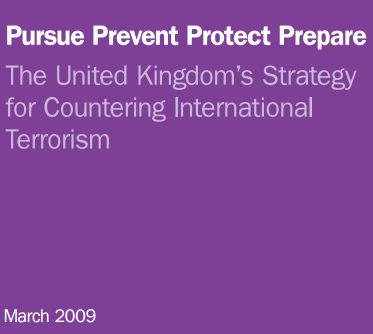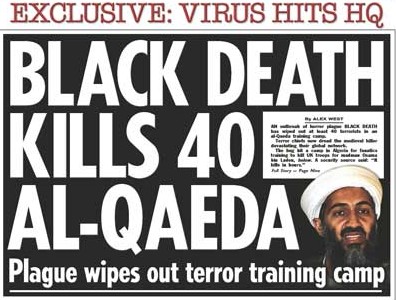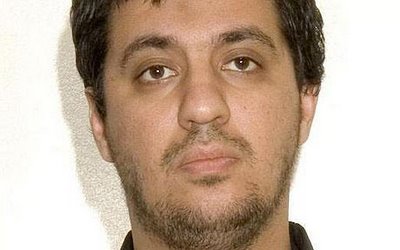Al-Qaida is dead. Long live al-Qaida.
Labels: al-Qaida, al-Shabaab, Ayman al-Zawahiri, jihadists, Osama bin Laden, takfirists, terrorism
Labels: al-Qaida, al-Shabaab, Ayman al-Zawahiri, jihadists, Osama bin Laden, takfirists, terrorism
FORTY convicted Islamic terrorists are back on the streets after being released from jail, a Sun investigation has revealed.
If this was the United States, a great many of these people coming out soon would have been sentenced to 99 years and locked away for the rest of their lives.
But in this country much weaker sentences have been handed down and a large percentage of them have received reductions from the Appeal Court.
As a result, we are faced with an extremely worrying situation. We have got to hope these people come out without violent extremist views. But the likelihood of that is slim.
IT'S time to get tough on the extremists.
It's time we stopped these people from operating in our society. Yet the preachers of hate continue to preach.
It's also time we outlawed radical groups who propagate extremist views and in doing so incite violence against innocent people.
Labels: al-Qaida, civil liberties, jihadists, liquid bombs plot, media reporting, scaremongering, Scum-watch, security services, Sun-watch, terror, terror suspects
Labels: Abdulla Ahmed Ali, al-Qaida, civil liberties, jihadists, John Reid, liquid bombs plot, media reporting, security services, terror, terror suspects
 Whenever the government hypes something up, you can almost guarantee that the end result will be less than the sum of its parts. So it is with the latest attempt by the Home Office to get to grips with something approaching an anti-terrorism strategy, which they have christened alliteratively pursue, prevent, protect and prepare, promoted heavily at the weekend by both Brown himself and Jacqui Smith. Using the protect word might well have taken something approaching balls: many minds still associate that with the ominous protect and survive booklets issued in the 80s, which matter of factly went through building a fallout shelter in the basement and wrapping up dead loved ones in black plastic bags, the eeriness and doom of the cartoons which accompanied the booklets still highly memorable now.
Whenever the government hypes something up, you can almost guarantee that the end result will be less than the sum of its parts. So it is with the latest attempt by the Home Office to get to grips with something approaching an anti-terrorism strategy, which they have christened alliteratively pursue, prevent, protect and prepare, promoted heavily at the weekend by both Brown himself and Jacqui Smith. Using the protect word might well have taken something approaching balls: many minds still associate that with the ominous protect and survive booklets issued in the 80s, which matter of factly went through building a fallout shelter in the basement and wrapping up dead loved ones in black plastic bags, the eeriness and doom of the cartoons which accompanied the booklets still highly memorable now.Our approach to national security in general and to counter-terrorism in particular is grounded in a set of core values. They include human rights, the rule of law, legitimate and accountable government, justice, freedom, tolerance and opportunity for all.
Labels: al-Qaida, dirty bombs, Gordon Brown, Islamists, Jacqui Smith, tackling extremism, terror, terrorism
Labels: Abdulla Ahmed Ali, al-Qaida, civil liberties, jihadists, John Reid, liquid bombs plot, media reporting, security services, terror, terror suspects
Labels: Abdulla Ahmed Ali, al-Qaida, civil liberties, jihadists, John Reid, liquid bombs plot, media reporting, security services, terror, terror suspects
I would not normally bother with this kind of nonsense were it not for the fact that it sheds light on the recent reports about AQIM’s alleged plague experiments, covered previously on Jihadica. Both stories were broken in the West by The Sun, and both stories relied on Algerian security sources. We are most likely dealing here with an anti-al-Qaida psy-op, and a very poor one at that.
Labels: al-Qaida, Algeria, black death, churnalism, gay rape horror, jihadists, media analysis, plague, propaganda, Scum-watch, Sun-watch
 Imagine for a moment you're some sort of security asset. You have a major story: 40 militants linked to al-Qaida in the Islamic Mahgreb (formerly the Salafist Group for Preaching and Combat) have apparently died of the plague. Either they were the victims of diseases inherent to living in the middle of nowhere in Africa, where outbreaks of plague are still reasonably regular, or, more frighteningly, they were possibly experimenting with weaponising plague, and were struck down themselves in the process. Whatever the truth, it's still a reasonably big story. Who then do you leak this to? A well-respected newspaper, such as the Times, Telegraph or Guardian? Or, on the other hand, the Sun?
Imagine for a moment you're some sort of security asset. You have a major story: 40 militants linked to al-Qaida in the Islamic Mahgreb (formerly the Salafist Group for Preaching and Combat) have apparently died of the plague. Either they were the victims of diseases inherent to living in the middle of nowhere in Africa, where outbreaks of plague are still reasonably regular, or, more frighteningly, they were possibly experimenting with weaponising plague, and were struck down themselves in the process. Whatever the truth, it's still a reasonably big story. Who then do you leak this to? A well-respected newspaper, such as the Times, Telegraph or Guardian? Or, on the other hand, the Sun?Labels: al-Qaida, black death, churnalism, jihadists, media analysis, plague, propaganda, Scum-watch, Sun-watch
Labels: al-Qaida, Intelligence and Security Committee, jihadists, Jonathan Evans, MI5, MI6, security services, terror, terrorism
 There seems to be a surprising lack of comment regarding Bilal Abdulla, convicted yesterday of his role as Abu Beavis in the Beavis and Abu Butthead do jihad plot and today sentenced to 32 years in prison. Surprising because, on the surface at least, Abdulla is the first verifiable example of genuine blowback against this country as a result of our involvement in the war against Iraq.
There seems to be a surprising lack of comment regarding Bilal Abdulla, convicted yesterday of his role as Abu Beavis in the Beavis and Abu Butthead do jihad plot and today sentenced to 32 years in prison. Surprising because, on the surface at least, Abdulla is the first verifiable example of genuine blowback against this country as a result of our involvement in the war against Iraq.Labels: al-Qaida, Bilal Abdulla, foreign policy, Glasgow airport attack, Iraq, Iraq disaster, Islamic State of Iraq, jihadists, Kafeel Ahmed, radicalisation, terror, terrorism
 In these times of apparently unstoppable mass-casualty extremist Islamist terrorism, the likes of the Baader-Meinhof gang, as they were known, or the Red Army Faction, as they called themselves, appear almost quaint by comparison. This might well be partly because in the UK we have never experienced much in the way of overt left-wing terrorism, our quota for targeted explosions having been filled by the IRA; doubtless their victims in Germany feel differently. Whilst the film only makes brief allusions to our modern-day reality, the one exemplary message which it puts across is that terrorism, regardless of who it is committed by or why, can only be defeated through legitimate, legal means. Much else is muddled and ambiguous.
In these times of apparently unstoppable mass-casualty extremist Islamist terrorism, the likes of the Baader-Meinhof gang, as they were known, or the Red Army Faction, as they called themselves, appear almost quaint by comparison. This might well be partly because in the UK we have never experienced much in the way of overt left-wing terrorism, our quota for targeted explosions having been filled by the IRA; doubtless their victims in Germany feel differently. Whilst the film only makes brief allusions to our modern-day reality, the one exemplary message which it puts across is that terrorism, regardless of who it is committed by or why, can only be defeated through legitimate, legal means. Much else is muddled and ambiguous.Labels: al-Qaida, Baader-Meinhof group, film review, Red Army Faction, terror, terrorism, The Baader-Meinhof Complex